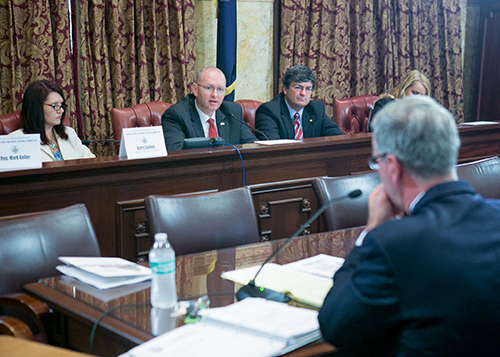State Preparing for Avian Influenza Outbreak, Causer Says
 |
| Rep. Martin Causer questions Agriculture Secretary Russell Redding about the state’s preparedness for a potential outbreak of highly pathogenic avian influenza. |
HARRISBURG – State agriculture leaders told lawmakers Wednesday they are taking several steps to prepare for the likelihood of an outbreak of highly pathogenic avian influenza (HPAI) in the Commonwealth.
Rep. Martin Causer (R-Turtlepoint), chairman of the House Agriculture and Rural Affairs Committee, organized the briefing to ensure members are informed about the situation and the state’s preparedness efforts.
“While it appears unlikely we can prevent the disease from coming to Pennsylvania entirely, I am encouraged by the efforts of the Department of Agriculture and the poultry industry to be prepared to contain it as much as possible,” Causer said. “I commend Agriculture Secretary Russell Redding for his leadership in this effort.”
Redding was joined at the meeting by Chris Pierce, president of Heritage Poultry Management Services Inc. of Annville; and Dr. Sherrill Davison, associate professor of avian medicine and pathology and director of the laboratory of avian medicine and pathology at the New Bolton Center, University of Pennsylvania School of Veterinary Medicine.
The presenters stressed that there has not been a case of HPAI related to this outbreak in the Commonwealth to date. However, the virus, which affects commercial poultry, backyard poultry and wild birds, is moving closer to the Commonwealth. According to Davison, the virus was confirmed in a wild goose earlier this week in southern Michigan, just 75 miles from Erie.
Davison also noted that, as of June 9, approximately 46.8 million birds have been affected on 228 premises in 21 states. Minnesota and Iowa are the hardest hit, with estimated economic losses of $300 million and $600 million respectively.
“This threat represents the likes of which the poultry industry has never seen,” Redding said. “The economic threat of HPAI in Pennsylvania is so great that we in state government cannot afford to get this wrong. With more than 11,000 flocks, more than $1 billion in sales, billions more in related economic activity and wages, and more than 53,000 jobs tied to the poultry industry, the long-term effects could be devastating financially to our state and those in and around the industry.”
A task force, which includes the Department of Agriculture, PennAg Industries, poultry industry officials and academia, has been formed and meets on a weekly basis via conference call. Several “tabletop” exercises have been conducted to practice a variety of response and recovery activities in the event of an outbreak. Meetings have also been held with other state agencies to identify their potential roles in monitoring and response. In addition, the department remains focused on education and outreach aimed at smaller, backyard operations to ensure they test and report any problems promptly.
Pennsylvania last dealt with HPAI in the mid-1980s when 17 million birds died and the economy suffered a $65 million loss. Since that time, the state has had an extensive surveillance program for avian influenza. According to Davison, the diagnostic laboratory tests approximately 250,000 samples each year. However, there is a concern about small-scale poultry farms that are not participating in the surveillance program.
The presenters also noted HPAI is not considered to be a threat to human health.
To watch footage of the meeting, visit
www.RepCauser.com
Representative Martin T. Causer
67th District
Pennsylvania House of Representatives
Media Contact: Patricia A. Hippler
717.772.9846
phippler@pahousegop.com
RepCauser.com /
Facebook.com/RepCauser